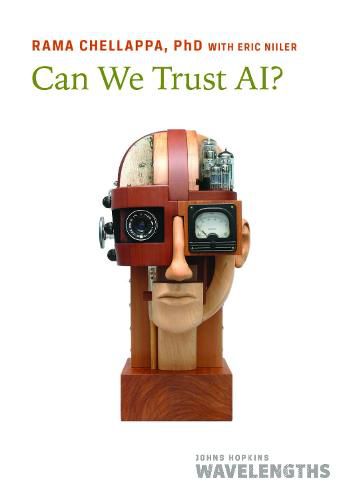Readings Newsletter
Become a Readings Member to make your shopping experience even easier.
Sign in or sign up for free!
You’re not far away from qualifying for FREE standard shipping within Australia
You’ve qualified for FREE standard shipping within Australia
The cart is loading…






Artificial intelligence is part of our daily lives. How can we address its limitations and guide its use for the benefit of communities worldwide?
Artificial intelligence (AI) has evolved from an experimental computer algorithm used by academic researchers to a commercially reliable method of sifting through large sets of data that detect patterns not readily apparent through more rudimentary search tools. As a result, AI-based programs are helping doctors make more informed decisions about patient care, city planners align roads and highways to reduce traffic congestion with better efficiency, and merchants scan financial transactions to quickly flag suspicious purchases. But as AI applications grow, concerns have increased, too, including worries about applications that amplify existing biases in business practices and about the safety of self-driving vehicles.
In Can We Trust AI?, Dr. Rama Chellappa, a researcher and innovator with 40 years in the field, recounts the evolution of AI, its current uses, and how it will drive industries and shape lives in the future. Leading AI researchers, thought leaders, and entrepreneurs contribute their expertise as well on how AI works, what we can expect from it, and how it can be harnessed to make our lives not only safer and more convenient but also more equitable.
Can We Trust AI? is essential reading for anyone who wants to understand the potential-and pitfalls-of artificial intelligence. The book features:
* an exploration of AI’s origins during the post-World War II era through the computer revolution of the 1960s and 1970s, and its explosion among technology firms since 2012; * highlights of innovative ways that AI can diagnose medical conditions more quickly and accurately; * explanations of how the combination of AI and robotics is changing how we drive; and * interviews with leading AI researchers who are pushing the boundaries of AI for the world’s benefit and working to make its applications safer and more just.
Johns Hopkins Wavelengths In classrooms, field stations, and laboratories in Baltimore and around the world, the Bloomberg Distinguished Professors of Johns Hopkins University are opening the boundaries of our understanding of many of the world’s most complex challenges. The Johns Hopkins Wavelengths book series brings readers inside their stories, illustrating how their pioneering discoveries and innovations benefit people in their neighborhoods and across the globe in artificial intelligence, cancer research, food systems’ environmental impacts, health equity, planetary science, science diplomacy, and other critical arenas of study. Through these compelling narratives, their insights will spark conversations from dorm rooms to dining rooms to boardrooms.
$9.00 standard shipping within Australia
FREE standard shipping within Australia for orders over $100.00
Express & International shipping calculated at checkout
Artificial intelligence is part of our daily lives. How can we address its limitations and guide its use for the benefit of communities worldwide?
Artificial intelligence (AI) has evolved from an experimental computer algorithm used by academic researchers to a commercially reliable method of sifting through large sets of data that detect patterns not readily apparent through more rudimentary search tools. As a result, AI-based programs are helping doctors make more informed decisions about patient care, city planners align roads and highways to reduce traffic congestion with better efficiency, and merchants scan financial transactions to quickly flag suspicious purchases. But as AI applications grow, concerns have increased, too, including worries about applications that amplify existing biases in business practices and about the safety of self-driving vehicles.
In Can We Trust AI?, Dr. Rama Chellappa, a researcher and innovator with 40 years in the field, recounts the evolution of AI, its current uses, and how it will drive industries and shape lives in the future. Leading AI researchers, thought leaders, and entrepreneurs contribute their expertise as well on how AI works, what we can expect from it, and how it can be harnessed to make our lives not only safer and more convenient but also more equitable.
Can We Trust AI? is essential reading for anyone who wants to understand the potential-and pitfalls-of artificial intelligence. The book features:
* an exploration of AI’s origins during the post-World War II era through the computer revolution of the 1960s and 1970s, and its explosion among technology firms since 2012; * highlights of innovative ways that AI can diagnose medical conditions more quickly and accurately; * explanations of how the combination of AI and robotics is changing how we drive; and * interviews with leading AI researchers who are pushing the boundaries of AI for the world’s benefit and working to make its applications safer and more just.
Johns Hopkins Wavelengths In classrooms, field stations, and laboratories in Baltimore and around the world, the Bloomberg Distinguished Professors of Johns Hopkins University are opening the boundaries of our understanding of many of the world’s most complex challenges. The Johns Hopkins Wavelengths book series brings readers inside their stories, illustrating how their pioneering discoveries and innovations benefit people in their neighborhoods and across the globe in artificial intelligence, cancer research, food systems’ environmental impacts, health equity, planetary science, science diplomacy, and other critical arenas of study. Through these compelling narratives, their insights will spark conversations from dorm rooms to dining rooms to boardrooms.